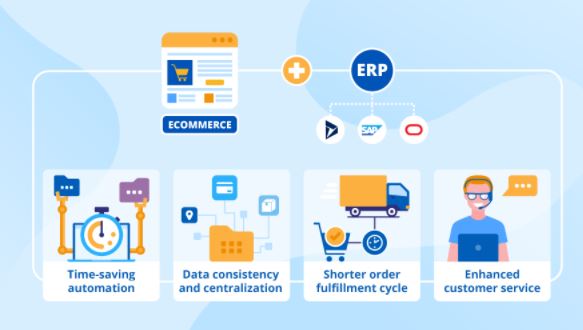As fast as the ecommerce industry has been growing over the years, it has gradually become integral to the global retail business architecture. Ecommerce enterprises across the world are projected to surpass $6.84 trillion in global retail sales by 2022. As of February 2021, there are an estimated 2.14 billion digital buyers globally. To the core of this exponential growth and ensuring its continuity is technology integration, for instance, the Enterprise Resource Planning (ERP) software.
Businesses need to scale up and keep a steady pace with the latest trends for maximum returns and revenue generation. Although ERP is not a novel idea or framework, it has proven its efficacy in streamlining business processes across industries time and again. Over the years, the modules within the ERP framework have been upgraded. It has allowed diverse businesses to leverage those for their benefits.
In 2020, the COVID-19 pandemic urged businesses to adopt digital and advanced automation tools to keep things running virtually, not to mention, a surge in digital service usage was felt among consumers globally. The sudden shift in business and consumer behavior dynamics accelerated the pace of digital transformation across industries.
Since then, ERP adoption has surged, with even the small and mid-level businesses integrating their existing framework with its cutting-edge modules to upgrade the infrastructure and internal management. It is expected that the accumulated revenue of ERP software integration will be more than $48.21 billion by 2025 globally.
The trend has been visible in the ecommerce industry. ERP has created a significant impact in streamlining inventory, customer management, sales, and other essential aspects that keeps the digital commerce machinery running.
Nevertheless, what entails ERP and ecommerce integration, and how does it help in operations streamlining and increased revenue? All of that and the benefits of integration have been elaborated below.
ERP and Ecommerce Integration
The successful execution of an ecommerce business demands front-end functions like web store management, customer interaction, and back-office operations to be in sync. It ensures a smooth workflow with minimum lags and errors.
However, this becomes a critical issue in the conventional ecommerce architecture where the level of synchronization is often lacking. The absence of interoperability between departments due to dependence on siloed frameworks leads to a gap in communication, a decline in productivity, and sluggish workflow.
ERP integration augments the processes making them more flexible through the following:
- Elimination of repetitive manual processes, minimizing the redundancy in data entry.
- Improvement in revenue tracking.
- Regular workflow monitoring and reporting become seamless.
- Well-defined, accurate, and detailed revenue reports for better strategizing.
- Eliminates errors in consumer and sales data processing.
That’s just the tip of the iceberg, as ERP integration with ecommerce infrastructure enables the businesses to align all of their core processes, the advantages of which go beyond accurate reporting and automation.
A simple example here; several ecommerce businesses have separate departments for data entry and other manual processes. It does nothing to streamline the process, making it time-consuming, susceptible to errors, and unnecessarily complex.
Since ERP software integration brings everything under a unified framework it adds a certain level of ease to the workflow, saving both time and operational cost. It also improves data storage and processing, while enhancing the overall security of the system.
The areas in ecommerce that can substantially benefit from ERP integration are:
- Customer information management.
- Product information management.
- Inventory management.
- Supply chain, including shipping.
- Pricing and payment processing.
- Invoice and order information management.
- Returns and refunds.
- Sales and taxation.
Advantages of ERP and Ecommerce Integration
Integrating your ecommerce infrastructure with ERP comes with a host of advantages such as:
- Real-time data management – ERP enables real-time tracking and management of the inventory, accounts, sales, orders, and other processes, creating a seamless order of operations.
- Augmented Customer Relation Management (CRM) – Ecommerce success hinges on customer relations that guarantee better revenue returns. ERP framework quantifies and collates the customer profiles providing them with personalized product recommendations that improve customer loyalty.
- Advanced retail automation – ERP automates the major processes like inventory and shipping management, warehouse management, tracking of the order status, etc., reducing both time and cost while upholding accuracy.
Ecommerce enterprises that have integrated ERP frameworks have experienced noticeable growth in business, improved ROI, sales-boost, and smooth execution of processes. It all owes to the value Enterprise Resource Planning adds to the overall business architecture guaranteeing holistic returns by driving revenue generation.
In today’s competitive and fast-evolving business world, one needs to keep up with the changes happening. The need of the hour at the moment is upgrading your legacy processes through digital upgrades. For ecommerce enterprises, that requirement can be sufficed extensively by Enterprise Resource Planning integration, enabling one to spearhead towards uninterrupted growth and scalability.
